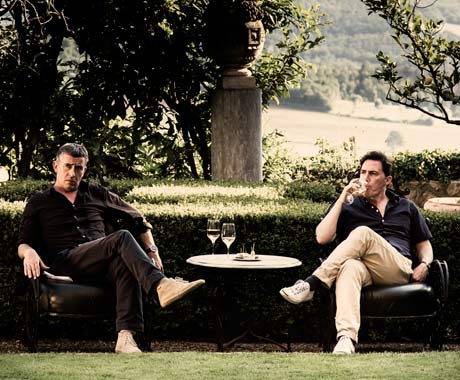Whether it's Mr. Bean's Holiday or Jamie's Great Escape, British television programs have long been known to take their characters and send them off to far-flung locations across Europe in the hopes of raising ratings, but to little avail. Michael Winterbottom's The Trip to Italy — the silver screen adaptation of the Italian leg of the semi-improvisational comedy show starring Steve Coogan and Rob Brydon — is no different, taking all the fun out of the original by transforming it into an overwrought emotional journey.
The premise is the same as the first incarnation of The Trip, a six episode mini-series by the BBC (that was later condensed into a full-length feature) about a pair of friends who traverse the English countryside in search of the country's gourmet hotspots, all in an attempt to recount their experiences for an article planned to be published in the British newspaper The Observer. The strength of the original program/film lay in the chemistry between Coogan and Brydon, two real-life buddies who spent every conceivable moment trying to outdo one another with their subtle jokes, ribbings and impressions of one another and the world's celebrities.
The impressions are still mostly the same — both actors battle it out trying to do better representations of Robert De Niro, Michael Caine and Roger Moore, to name a few — but the sense of charm and camaraderie is strangely absent. This is mostly due to Coogan and Brydon's character development; while Brydon as a humorous and level-headed stay-at-home hubby helped balance out Coogan's image of a swaggering, egotistical lothario in the first film, The Trip to Italy finds the pair switching roles, as Coogan contemplates forgoing his movie career in the hopes of spending more time with his 16 year old son, and Brydon chooses to focus his efforts on cinematic and sexual adventures away from his wife and young child. While Coogan's transition is easy enough, Brydon's role-reversal renders his character a detestable mess, making it hard for the viewer to connect with the character and the flaws that made him so charming in the first film.
To compensate for this, Winterbottom's sequel spends much of its time setting up dramatic situations, rather than giving his actors enough space to focus on the comedy. (Extended sequences joking about Tom Hardy's portrayal in The Dark Knight Rises and the lyrical prowess of Canadian singer-songwriter Alanis Morissette feel particularly forced and hackneyed, considering the ample screen time given to each observation.)
That doesn't mean The Trip to Italy is without its merits. The visuals and settings look stunning, as does the food. Even forays into the history of Italian cinema and romantic literature help heighten the film's characters and their experiences overall. However, much like an appetizer, The Trip to Italy ultimately leaves viewers unsatisfied and wanting more.
(eOne)The premise is the same as the first incarnation of The Trip, a six episode mini-series by the BBC (that was later condensed into a full-length feature) about a pair of friends who traverse the English countryside in search of the country's gourmet hotspots, all in an attempt to recount their experiences for an article planned to be published in the British newspaper The Observer. The strength of the original program/film lay in the chemistry between Coogan and Brydon, two real-life buddies who spent every conceivable moment trying to outdo one another with their subtle jokes, ribbings and impressions of one another and the world's celebrities.
The impressions are still mostly the same — both actors battle it out trying to do better representations of Robert De Niro, Michael Caine and Roger Moore, to name a few — but the sense of charm and camaraderie is strangely absent. This is mostly due to Coogan and Brydon's character development; while Brydon as a humorous and level-headed stay-at-home hubby helped balance out Coogan's image of a swaggering, egotistical lothario in the first film, The Trip to Italy finds the pair switching roles, as Coogan contemplates forgoing his movie career in the hopes of spending more time with his 16 year old son, and Brydon chooses to focus his efforts on cinematic and sexual adventures away from his wife and young child. While Coogan's transition is easy enough, Brydon's role-reversal renders his character a detestable mess, making it hard for the viewer to connect with the character and the flaws that made him so charming in the first film.
To compensate for this, Winterbottom's sequel spends much of its time setting up dramatic situations, rather than giving his actors enough space to focus on the comedy. (Extended sequences joking about Tom Hardy's portrayal in The Dark Knight Rises and the lyrical prowess of Canadian singer-songwriter Alanis Morissette feel particularly forced and hackneyed, considering the ample screen time given to each observation.)
That doesn't mean The Trip to Italy is without its merits. The visuals and settings look stunning, as does the food. Even forays into the history of Italian cinema and romantic literature help heighten the film's characters and their experiences overall. However, much like an appetizer, The Trip to Italy ultimately leaves viewers unsatisfied and wanting more.




